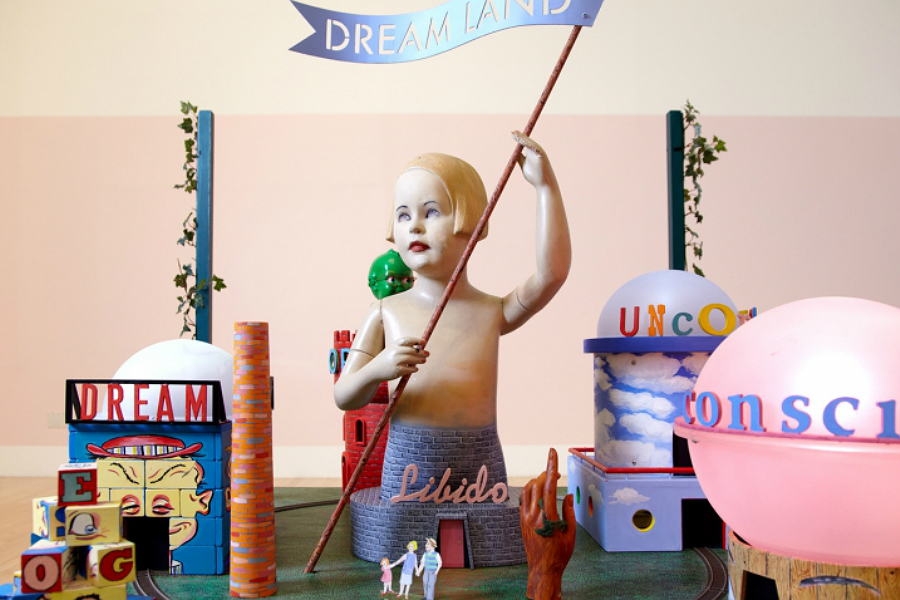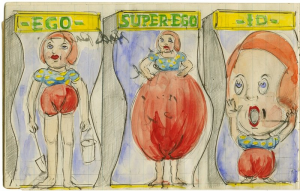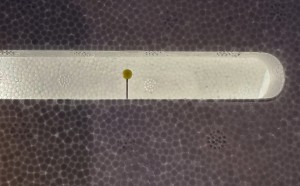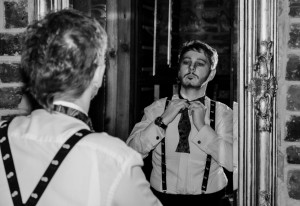Zoe Beloff: DREAMLAND

Zoe Beloff constructs a world of escapism, dreams and admiration in the Grundy Gallery’s latest exhibition, finds Denise Courcoux…
Sigmund Freud, founding father of psychoanalysis, paid a visit to the Coney Island funfairs, New York in 1909, perhaps in search of a little respite and entertainment before the lecture series he was en route to.
We can only speculate as to what he would have made of Dreamland, at Blackpool’s Grundy Art Gallery, with its ‘Creation’ tunnel entrance guarded by a gigantic nude sculpture, banks of incubators holding tiny premature babies to be gawped at, and the dark and dingy Hell Gate, via which the park met its maker in 1911 when exploding lightbulbs and a bucket of hot pitch combined to set the whole place ablaze.
In DREAMLAND, Zoe Beloff goes one better than idle speculation, taking this tiny spark of trivia to create an alternative reality in which the park’s community was inspired to explore Freud’s theories further.
The Coney Island Amateur Psychoanalytic Society was founded in 1926 by one Albert Grass (as Beloff diplomatically says, ‘Albert Grass and I, we often dream the same dreams’), an amusement park designer, partly as a route to freedom from the social hang-ups and prejudices of the time.
Central to this exhibition is a model of a new Dreamland (reimagined by Grass but sadly never realised) as a truly Freudian wonderland with fantastical pavilions of Consciousness and Unconsciousness, heralded by a flag-waving girl representing Libido.
There are tantalising glimpses at what the pavilions might have contained throughout this exhibition, mostly depicted in sheets of delicate pencil and watercolour scribblings, doodles and diagrams, the products of the Society’s enquiring minds. A fanciful new version of dodgems involves bumper cars painted up to represent different pathological symptoms colliding on a Freudian map of the mind.

The Society’s archives are mined further as the exhibition investigates its annual Dream Film Competition, founded of course by Grass, for which members created dramatic cinematic representations of their dreams. Visitors are invited to pull up a deckchair to view a selection of these, or enter a little booth to get an ‘authentic’ 16mm projector experience.
In the upstairs gallery there is a wonderful set of hand-drawn pages from a comic book-style dream journal conceived by Grass, which like the film competition, is testament to a laudably democratic vision in which a Freudian education would be made accessible to ordinary workers via unashamedly populist media.
Beloff’s exhibition was conceived for the pleasingly eccentric-looking Coney Island Museum to mark the centenary of Freud’s trip to the resort, but it seems the man had something of a fondness for seaside towns. The year before, in 1908, Freud visited Blackpool, even sending a postcard home speaking warmly of his time there.
From this other scrap of reality Beloff has spent the past couple of years uncovering evidence of Grass’ international scope via the Blackpool Chapter, providing a thoughtful local association to this show. The Chapter’s archive is displayed at the Grundy for the first time alongside profiles of its members; as with its Coney Island counterpart, they are staunchly socialist and working class.
An ethereal, large-scale faded pencil work explores a psychoanalytic reading of Blackpool’s long-lost supernatural Fairyland ride, whilst the superbly-named Bert Barrow’s masterpiece ‘Saucy Seaside Postcards and their relation to the Unconscious’ delves into the none-too-subtle stick of rock and pussycat metaphors beloved of Donald McGill and co.
DREAMLAND is the latest show in the Grundy’s programme that skilfully blends contemporary art with a fitting seaside sensibility, following on from last year’s playable Adventureland Golf course (with controversial saluting Hitler obstacle courtesy of the Chapman Brothers) and surreal displays of Blackpool illuminations by Brian Griffiths.
The ice-cream palette of the walls, the art deco typeface used throughout and the peeling wooden signs, shipped over from Coney Island, all help to conjure a dreamy, nostalgic character here, whilst the overt pleasure-seeking intentions of places like Coney Island and Blackpool provide rich pickings for Freudian interpretations.
A dark seam of humour runs through Beloff’s work alongside a serious commentary on class and personal liberation in this complex and hugely enjoyable exhibition.
Denise Courcoux
Grundy Art Gallery, Queen Street, Blackpool, FY1 1PU
Exhibition continues until 2 November 2013





